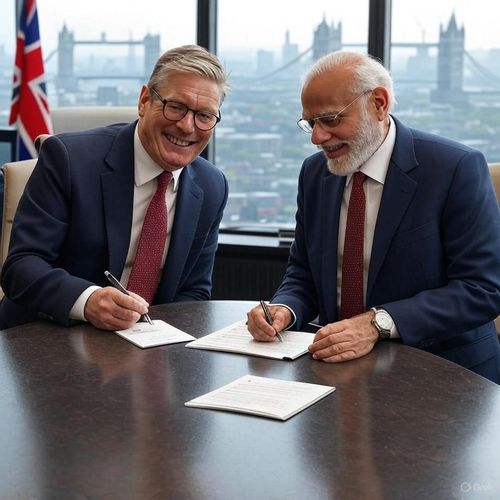EU-India Free Trade Agreement: A New Horizon for Startups and SMEs

Sarah J
Posted on Sun, Mar 2, 2025
Share the article with your network
As the EU and India work to finalize their landmark free trade agreement (FTA) by late 2025, startups and small businesses stand to gain unprecedented opportunities in cross-border innovation, sustainability, and market expansion. With negotiations entering their 10th round in March 2025, here’s how this partnership could reshape opportunities for agile businesses.
Where the Negotiations Stand
The EU and India revived FTA talks in 2021 after a 14-year hiatus, driven by mutual goals to counter geopolitical uncertainties and diversify supply chains. Bilateral trade hit $135 billion in 2022-23, with the EU as India’s largest trading partner in goods. Despite delays, both sides aim to finalize the deal by December 2025.
- Key Focus Areas:
- Reducing tariffs (e.g., India’s 100% duty on EU cars)
- Aligning sustainability standards (EU’s Carbon Border Tax vs. India’s growth needs)
- Expanding services trade, which doubled to €59.7 billion since 2020
Sector-Specific Opportunities for Startups
1. Green Energy and Cleantech
The EU’s Green Deal and India’s 500 GW renewable energy target by 2030 create synergies for startups:
- Solar/Wind Partnerships: Collaborate on low-cost manufacturing of solar panels in India for EU markets.
- Hydrogen Innovation: Joint ventures in green hydrogen production and storage tech.
- Circular Economy: Opportunities in battery recycling (India’s EV market grew 154% in 2024) and plastic waste management.
Example: A German startup partnered with an Indian firm to convert agricultural waste into biofuel, cutting emissions by 30%.
2. Technology and AI
The EU-India Trade and Technology Council (TTC) is prioritizing:
- Semiconductor Ecosystems: A new MoU focuses on R&D, skill development, and supply chain resilience.
- 6G and Cybersecurity: Pilot projects for IoT startups and secure network solutions.
- AI Governance: Tools for ethical AI development could gain traction in both markets.
Example: A Bengaluru-based AI healthtech firm reduced diagnostic costs by 40% using EU-funded algorithms.
3. Pharmaceuticals and Healthcare
- Generic Drug Expansion: Simplified EU approvals for Indian pharma startups.
- API Transparency: Joint frameworks to track active pharmaceutical ingredients (APIs).
- MedTech Innovation: AI-driven diagnostics and telemedicine platforms targeting rural India.
4. Agri-Tech and Food Security
- Smart Farming: EU precision agriculture tools + Indian agri-tech platforms = solutions for soil health and crop yields.
- Organic Certification: Mutual recognition could help Indian organic brands enter EU markets.
While opportunities abound, startups must navigate:
- Regulatory Hurdles: GDPR vs. India’s data protection laws; differing sustainability certifications.
- Tip: Use the EU-India Digital Regulatory Dialogue for compliance guidance.
- Funding Gaps: Limited cross-border venture capital.
- Tip: Apply for grants like Horizon Europe (EU) or AIM-PRIME (India).
- IP Protection: Stricter EU patent laws vs. India’s generics-friendly policies.
- Tip: Leverage the FTA’s proposed dispute resolution mechanisms.
Recent Progress: Von der Leyen’s 2025 Visit
The February 2025 EU-India summit accelerated momentum:
- Semiconductor Pact: A new agreement to co-develop chips and share technical expertise.
- Defense Collaboration: Startups in drones, cybersecurity, and aerospace may access joint R&D projects.
- Green Hydrogen Alliance: Targets 5 million tonnes of annual production by 2030.
Actionable Steps for Startups
- Join Industry Coalitions: Engage with the EU-India TTC working groups on tech and sustainability.
- Localize Early: Set up lean teams in EU/India to understand cultural and regulatory nuances.
- Leverage Grants: Explore the €10B EU-India Connectivity Fund and India’s Startup India Seed Fund.
- Monitor Key Issues: Watch for final decisions on digital tax parity and e-commerce rules.
The Bigger Picture
This FTA isn’t just about tariffs—it’s a gateway to a $300B+ economic corridor. For startups, success will depend on agility: adapting to green regulations, forging cross-border partnerships, and tapping into emerging sectors like carbon trading and ethical AI.
As negotiations advance, businesses that align with the EU’s sustainability goals and India’s digital transformation agenda will lead this new era of collaboration.
---
Join the exclusive network for leaders driving growth and partnerships in tech and science - www.startupeuropeindia.net
You may also like
Team S
Wed, Jul 30, 2025
US-India’s Game-Changing Satellite Launch: Unlocking Earth’s Hidden Secrets

Team S
Wed, Jul 30, 2025
Temasek Nets 10-Fold Gain with S$8.2 Billion Stake Sale in Schneider Electric India

Sarah J
Thu, Jul 24, 2025
UK and India seal Free Trade Agreement Signed in London
